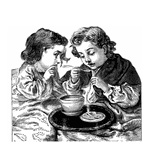
Better Is One Day in Your Courts
TRANSFIGURING THE WEEKEND
During the reign of COVID-19, the majority of ink spilled in the Catholic press concerning liturgy pooled around the question of the Eucharist, and rightly so. The Sacrifice of the Mass is the “source and summit” of the Christian life, after all. The context of that source and the experience of the summit, however, stand alone on a drier portion of the page. Not only did the months of lockdowns deprive Catholics of sacramental grace, but they are now, more than ever, at risk of losing a sense of the broader setting within which the Mass sits and the final goal toward which the Mass points: the Dies Domini, the Day of the Lord. A clarion call back to the rest for which we were created is more necessary now than ever.
[Jesus] took Peter, James, and John up into a mountain to pray. And whilst he prayed, the shape of his countenance was altered and his raiment became white and glittering. — Luke 9:28-29
You can imagine Peter, James, and John’s reaction — not to the dazzling white of the transfigured Lord, not to the conversation about Christ’s impending Exodus, not even to the voice from the cloud. None of us has known such experiences. But you can imagine Peter, James, and John’s reaction to Jesus’ calling them for this peak ascent and mountaintop prayer vigil: pride at being chosen from the twelve; excitement at what they might be discerning in prayer; and, yes, weariness at the thought of yet another long hike and another sleepless night. Let’s be honest: you’ve never been able to stay up as late as Jesus anyway.
When the skyward trudging ends, and the Lord sets to pray, removing His sandals, you follow suit, looking down at the mile-worn straps. Sleep overcomes you. You can’t tell whether you’ve fought the compulsion to close your eyes or whether you’re still awake, but you feel yourself turning your eyes back toward the Master, and your retinas scream out — not with pain but with a sense of fullness they’ve never before experienced. Whiteness itself seems to clothe Jesus, brighter than the sun yet without discomfort. Before being forced to look down again by some intuitive compulsion, you notice two other men, one with a staff, the other gird with a belt and animal skins. It’s as if the power you saw breaking through when the hemorrhagic woman touched Him, the spark of truth you felt as He spoke of a Kingdom where the meek would rule, and the gladness of that Cana wine all burst forth into completeness. Whatever is happening, you seem to be witnessing power without peer, truth ineffable, and joy unending. You are touching wholeness itself, at once the root and flower of all things.
Through what seems a waking dream comes a voice — yes, of course, the one booming from the cloud — saying, “This is my son in whom I am well pleased. Listen to Him.” But there’s a second voice, strangely still yet entirely discernable through the din of silence left in the wake of the first. This second, small voice says something familiar; its words are the same as those spoken long ago to the man clad with the skins: “What are you doing here?” You say the first and, as it happens, best thing that comes to mind: “Lord, it is good that we are here. Let us build three tabernacles, one for you, one for Moses, and one for Elijah.” All you can think to do is to remain, to dwell with wholeness forever. Had not the Master spoken so often of how He would dwell with, remain with His disciples, that He and His Father would make Their home with us? Perhaps now is that time.
You May Also Enjoy
Dying alone offers us an occasion for honest introspection and heartfelt contrition for the sins we have committed.
The faults of the past few years were not small, and they require much contrition and conversion, above all from our leaders.
Everything in the old Requiem Mass forced us to consider death and God’s judgment, Christ’s mercy and our complacency.

